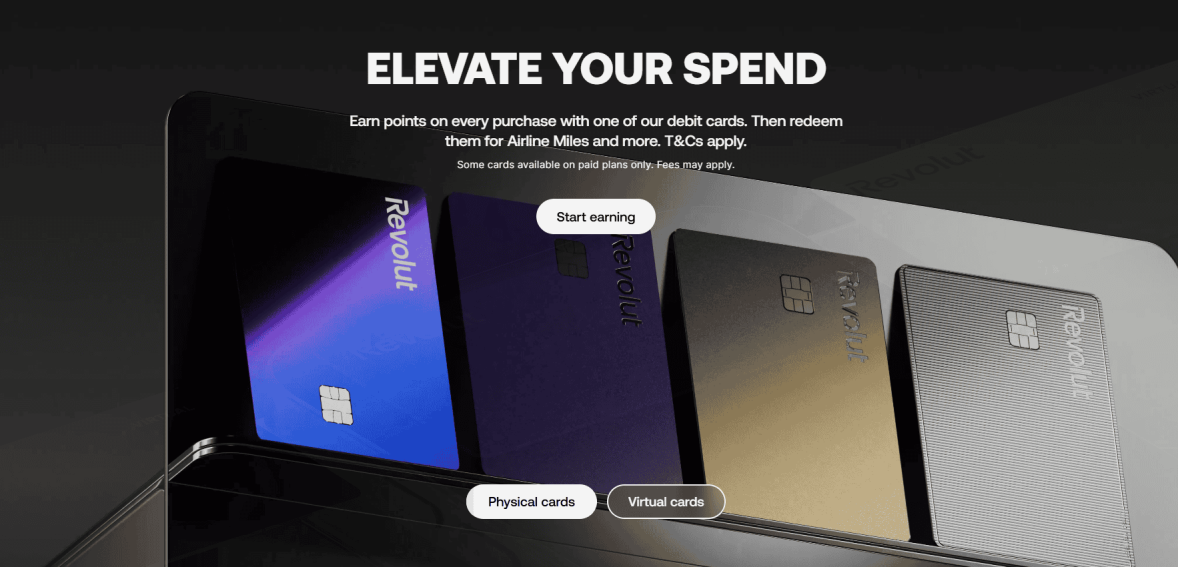Revolut Review

Revolut was founded in 2015 as a currency exchange app for travellers and has since grown into a full financial platform used by millions worldwide. Based in the UK, it aimed to disrupt traditional banking by offering fast, app-based services for money management, payments and investing. As of 2025 it serves both personal and business customers across multiple countries. Lets read more about Revolut Review.
What sets Revolut apart is its digital-first model. It doesn’t have physical branches. Everything – from opening an account to trading stocks – is done through the app. Features like budgeting, global payments, currency exchange and crypto trading are all built in. Its appeal is strongest among younger users and those who travel or work across borders frequently.
A big part of Revolut’s appeal is how it simplifies international money management. You can hold, exchange and spend in more than 25 currencies. But as the company grows fast some concerns have emerged around regulatory clarity and customer support. In some markets Revolut has obtained banking licences and offers full banking services. In others it still operates under an e-money licence. This means the level of security and protection for your funds varies depending on where you are.
Account Options and Setup Experience | Revolut Review
Revolut offers four main account types: Standard, Plus, Premium and Metal. The Standard plan is free and includes core features like currency exchange, virtual cards and budgeting tools. The paid plans unlock more perks like travel insurance, airport lounge access and higher limits on currency exchange and ATM withdrawals.
Signing up is usually quick. Users download the app, upload a government ID and complete verification steps. Most people can start using the account within minutes. The app guides users through the setup process clearly so even those new to digital banking can do it.
The app avoids the paperwork and branch visits you’d find with traditional banks. You can open a multi-currency account and start transacting from your phone. However some users have faced delays if their ID documents aren’t accepted or if there’s high traffic. While these cases aren’t the norm they can be frustrating when they happen. Overall the setup process is smooth for most users especially those who are comfortable using mobile apps.
Currency Exchange and International Transfers
Revolut is widely known for its competitive currency exchange features. Users can hold and swap between over 25 currencies, often at interbank rates during weekdays. Transfers to other Revolut users are instant and free, while sending to external bank accounts typically comes with low fees.
This makes Revolut a great option for travelers, freelancers, or remote workers dealing with different currencies. The app provides live exchange rates, allowing users to convert money at the best possible times. Transfers are supported in over 200 countries, often arriving within a couple of days, though this can vary.
You can also set up recurring payments or split bills with friends internationally. These tools are especially helpful for families living in different countries or professionals managing cross-border expenses. However, it’s important to avoid converting currency on weekends, when markups apply. Also, free exchange limits differ by plan; Standard users get a limited amount per month before fees kick in.
Revolut remains one of the strongest platforms for international money movement, provided users manage timing and plan limits carefully.
Card Features and Spending Control
Revolut offers multiple card options: physical debit cards, virtual cards, and single-use cards designed for safer online shopping. All are linked to the Revolut account and can be used globally. A key advantage is the ability to manage cards directly from the app. Users can freeze and unfreeze cards, set budgets, control spending categories, and adjust security settings like swipe or contactless payments.
The app also provides detailed spending insights, helping users track where their money goes. Categories like groceries, travel, and entertainment are clearly displayed. There’s also a feature called “Vaults,” where users can round up purchases and automatically save the change. Instant transaction alerts help detect any unusual activity quickly. For those who travel often, the global usability of Revolut cards and competitive exchange rates make them especially useful.
Still, some users have reported payment failures during travel. These are usually caused by low balances or fraud filters, but they can be inconvenient if you’re relying solely on the card. All in all, the card and spending tools are well thought out, and they suit people who value control and flexibility in managing their money.

Trading: Crypto, Stocks, and Commodities
Revolut brings investment tools into the same app as everyday banking. Users can buy and sell cryptocurrencies, U.S. stocks, and commodities like gold or silver without needing separate accounts or platforms. In crypto, Revolut supports popular assets like Bitcoin and Ethereum. The interface is beginner-friendly, though users don’t get private keys; Revolut holds assets on your behalf, more like a custodian service.
Stock trading is limited to major U.S. companies and supports fractional shares. It’s easy to use but lacks advanced tools like detailed charts or analyst reports, so it’s best for casual investors rather than serious traders. Commodities like gold and silver can also be bought in small amounts and tracked in real time. These too are meant more for light investing rather than active trading.
Fees include spreads and transaction costs, which are relatively low for beginners. However, those trading in high volumes may find better rates elsewhere. For users looking for basic, accessible investment tools, Revolut offers a convenient entry point.
Business Accounts and Tools
Revolut Business is for modern entrepreneurs, freelancers and online businesses. It has features like multi-currency accounts, global transfers, invoicing and easy team expense management. Businesses can send and receive money in different currencies, often cheaper than traditional banks. Revolut allows companies to issue cards to team members and set permissions to track expenses.
The platform integrates with accounting tools like Xero and QuickBooks and Slack. API access is available for businesses that need automation and custom reporting, perfect for e-commerce sellers and tech driven teams. Freelancers can create invoices and get paid directly into their account, no complex setup or delays. For basic business banking Revolut Business works.
But for more advanced services like loans or payroll features it’s limited. And customer support for business users has been slow to respond to more complex cases. In short Revolut Business is good for startups and remote teams but not for big or traditional businesses.
Security and Regulatory Status
Revolut places a strong emphasis on security. It uses encryption, biometric login, fraud detection, and real-time alerts to protect user accounts. You can freeze cards, receive instant notifications, and use two-factor authentication from within the app. Regulatory status, however, varies by country. In some places, Revolut holds a full banking license and can offer deposit insurance and lending services. In others, it remains an e-money institution, which offers fewer protections.
Revolut complies with anti-money laundering and know-your-customer rules, which means some users might experience account freezes or extra verification steps. These can be frustrating, especially when support is slow to help. As the platform expands into more regulated areas like trading and credit, users should check how Revolut is licensed in their region and what protections apply. Security-wise, Revolut takes the right steps, but the lack of uniform regulation can create confusion, especially for international users.
Fees and Plan Pricing
Revolut’s pricing follows a freemium model. The Standard plan is free, while Plus, Premium, and Metal plans have monthly fees with added benefits. Currency exchange is free up to a monthly limit for Standard users, with higher or unlimited limits on paid plans. Weekend currency exchanges carry a markup, and fees apply if you exceed withdrawal or transfer limits.
Trading fees apply to crypto, stocks, and commodities. Users get a few free trades each month, after which small fees kick in. These are spelled out in the app and are generally low for casual use. Other charges include ATM withdrawal fees (after limits), card delivery costs, and international wire fees. These don’t always appear upfront, so it’s important to review the full fee schedule.
Despite the fees, Revolut remains competitive when compared to traditional banks, especially for international use. However, it’s not completely fee-free, and users should understand their plan’s limitations.

Customer Support and User Experience
Revolut’s customer service receives mixed feedback. Support is offered through in-app chat, with faster responses for paid plan users. Free users may have to deal with bots or longer wait times. Basic issues like card orders or app navigation are usually resolved quickly. But when problems involve frozen accounts, delays in verification, or missing transfers, users often report slow or unhelpful responses.
There is no phone support for most users, and the Help Center, while detailed, doesn’t cover every scenario. Online reviews praise the app’s design and usability but frequently mention poor customer service as a drawback. Users with higher-tier accounts report better support, but the experience can still be inconsistent. In general, support works well for simple tasks but is less reliable for urgent or complicated matters.
Final Verdict: Is Revolut a Good Choice in 2025?
Revolut offers a feature-rich, mobile-first banking experience ideal for tech-savvy users, travelers, and small teams. It combines personal finance, global payments, and investments with competitive fees. However, service quality and regulatory support vary by region. It’s a strong option, but users should understand limitations before fully relying on it.
FAQs
Q1. Is Revolut a real bank or just a fintech company?
Revolut operates as a fintech platform but holds banking licenses in some countries. In others, it functions as an e-money institution. Your account protections depend on your region.
Q2. Can I use Revolut for business?
Yes. Revolut offers business accounts with features like multi-currency support, invoicing, API integration, and global transfers. It works well for freelancers, startups, and digital-first teams.
Q3. Is Revolut safe for storing money and making payments?
Revolut uses encryption, two-factor authentication, and fraud detection to secure your money. However, your level of protection depends on whether you’re in a region where Revolut holds a banking license.





